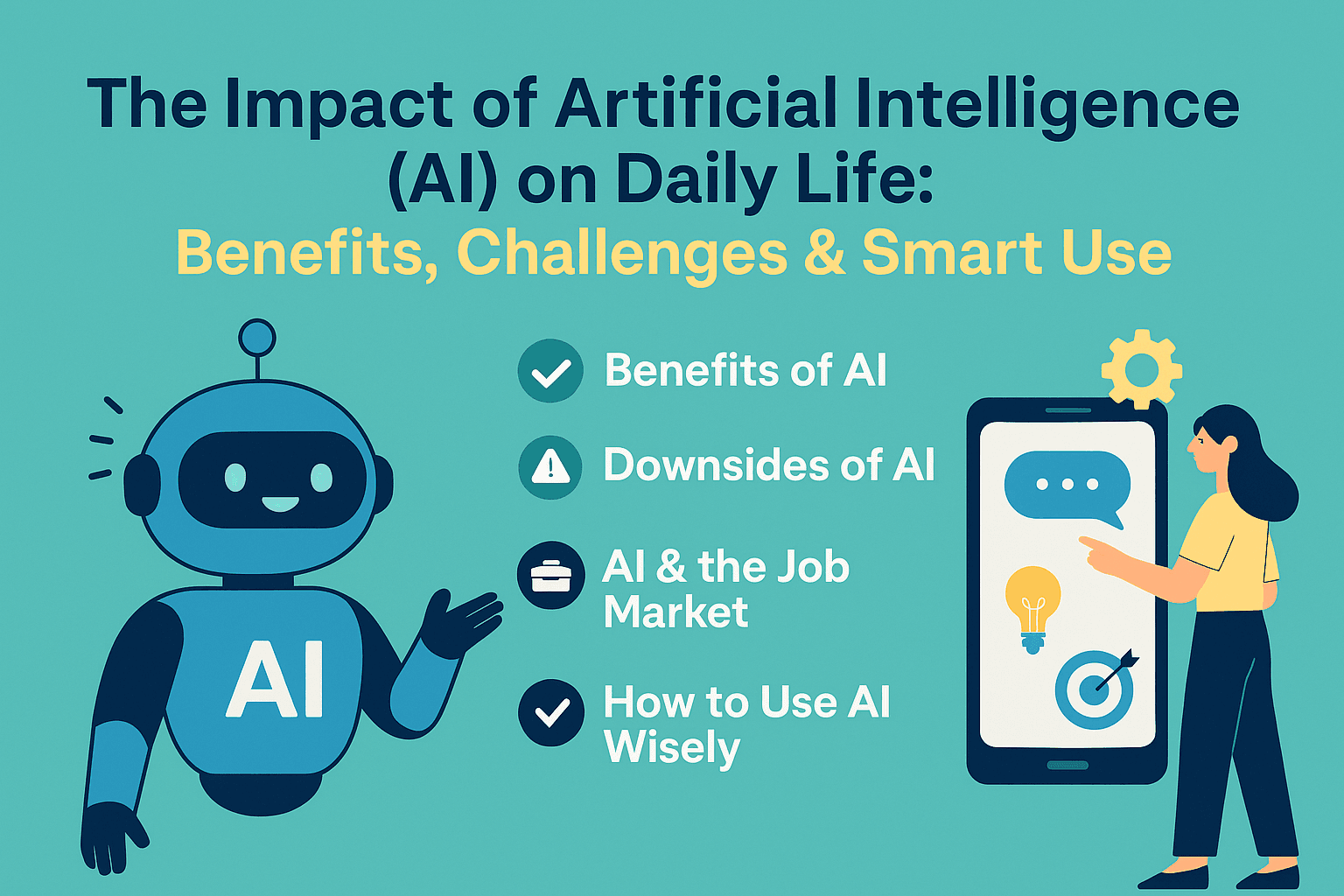Artificial Intelligence (AI) is rapidly becoming a part of our everyday lives. Whether it’s the smart speaker in your living room, the facial recognition on your phone, or the product suggestions when shopping online, AI is everywhere. But while it brings countless conveniences, it also raises concerns, especially around jobs, privacy, and dependence on machines.
In this article, we’ll explore how AI affects daily life, its benefits and drawbacks, how it’s reshaping the workforce, and how we can use it wisely for a better future.

By Fikar Not Accessories
Explore smart gadgets, mobile accessories, and innovative gift ideas for a tech-savvy world.
🤖 What Is Artificial Intelligence (AI)?
AI refers to machines and software designed to mimic human intelligence. It includes technologies like:
- Voice assistants (Alexa, Siri, Google Assistant)
- Recommendation systems on shopping sites
- Smart gadgets and wearables
- Chatbots for customer service
- Self-driving vehicles
AI learns from data and improves over time—making it a powerful tool in both personal and professional spaces.
🌟 How AI Benefits Daily Life
1. Convenience and Time-Saving
AI-powered devices like smart home assistants, automatic reminders, and voice-controlled gadgets simplify daily tasks. Whether you’re setting an alarm or ordering groceries, AI saves time and effort.
2. Personalization
From movie recommendations on Netflix to personalized shopping on Amazon, AI helps tailor content and products to your preferences.
3. Health and Fitness Tracking
Smartwatches and fitness bands use AI to monitor your heart rate, sleep patterns, and activity levels—helping you stay fit and informed.
4. Improved Accessibility
AI helps people with disabilities by offering voice-to-text tools, real-time translation, and navigation for the visually impaired.
⚠️ The Downsides: What We Need to Be Aware Of
1. Job Loss Due to Automation
One of the most significant concerns is that AI is replacing human jobs. Industries like manufacturing, customer service, content writing, and logistics are increasingly using machines or software instead of people.
Example: Many companies now use AI chatbots instead of human agents for handling customer queries.
2. Loss of Human Interaction
As we rely more on machines for communication and tasks, we risk losing essential social and interpersonal skills.
3. Privacy and Security Risks
AI needs data to function—and lots of it. If not managed properly, this could lead to misuse of personal information or breaches of privacy.
4. Overdependence on Technology
Heavy reliance on AI can make us less critical thinkers, reducing problem-solving skills and making us overly dependent on machines.
🧠 How to Use AI Wisely
AI is a powerful tool—but like any tool, it depends on how we use it. Here are some tips for responsible and smart usage:
✅ Be Selective
Use AI to make life easier, but don’t let it replace real human interactions or decisions completely.
✅ Protect Your Privacy
Always check app permissions, use secure passwords, and avoid sharing personal data unnecessarily.
✅ Keep Learning
Stay informed about how AI works. This helps you understand what it can (and can’t) do—and how it may affect your job or lifestyle in the future.
✅ Balance Automation with Human Touch
While AI can automate tasks, keep human creativity, empathy, and decision-making at the core of your life and business.
💼 The Bigger Picture: How AI Is Changing the Workforce
AI is transforming industries at a rapid pace:
- Retail: Smart inventory systems and virtual shopping assistants
- Healthcare: AI diagnostics and wearable health monitors
- Transportation: Self-driving vehicles and predictive traffic tools
- Content Creation: AI writing tools and image generators
While these technologies increase efficiency, they often replace routine jobs. The key is reskilling and upskilling—learning new skills to stay relevant in a world where AI handles repetitive tasks.
🎁 AI and the World of Gadgets
At Fikar Not Accessories, we embrace the power of AI through innovative tech products and smart gadgets. Our collection includes:
- Smart accessories that use AI for voice control and automation
- Wearables that track health and lifestyle
- Gifting solutions that reflect the modern, tech-savvy world
Whether you’re shopping for a birthday gift or upgrading your mobile accessories, explore how AI-powered devices can elevate your everyday life.
📌 Final Thoughts
Artificial Intelligence is here to stay—and it’s up to us to decide how to use it. When applied responsibly, AI can enhance our lives, boost business productivity, and open up new possibilities. But we must also stay mindful of its downsides, especially when it comes to jobs, ethics, and human connection.
Let’s embrace AI wisely, ethically, and thoughtfully—making sure that it remains a tool for empowerment, not replacement.
🔍 Explore Smart Living Today
Visit Fikar Not Accessories to discover the latest AI-powered gadgets, mobile accessories, and gift items that make life smarter, easier, and more fun.
